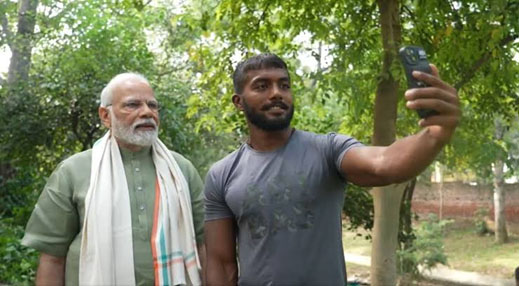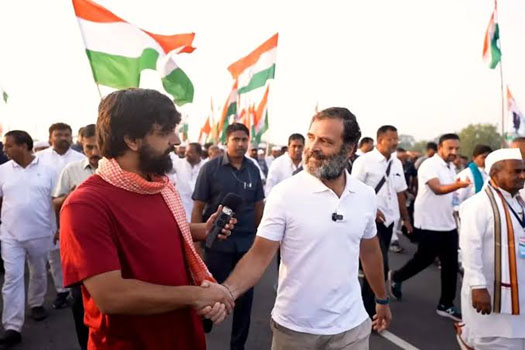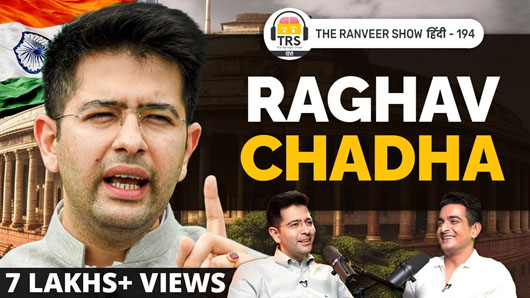The 2024 general election is knocking on the door. All the political parties of India are gearing up for the election. While the ruling party is trying to make a hat trick, the opposition is trying to stop it anyway.
Among all these fights, every political party is concerned about a vote bank – that’s the youth vote bank or precisely the Gen-Z vote bank. Every political party wants to tap into that vote bank.
But how to win the hearts of this vote bank is a big question in front of all of them. To solve this problem and win the hearts of these young voters, politicians have chosen the medium of social media.
Now all the political parties are trying to use social media influencers as their weapon to get these Gen-Z voters on board. With the decline in belief in the traditional media, influencers have become the new medium of communication for politicians with the general public.
BJP Setting The Trend
While BJP and Prime Minister Modi are trying to make it into their third term, they first started this trend of collaborating with influencers to win the youth vote.
On 26th May, when Prime Minister Modi completed his 9th anniversary in his office, the Gujarat BJP unit celebrated this occasion by holding a meetup with 250-300 influencers with more than a lakh followers in a posh hotel. Various kinds of content creators were invited from vloggers to educational content creators.
The meeting was mainly held to take the help of these influencers to spread the info about the work done and achievements of the Modi Government in the last 9 years. Chief Minister Bhupendra Patel and State BJP chief were present in the meeting.
Since then BJP has held several meetings around the country with different social media influencers to collaborate with them or ask them to spread their work and message.
Collaboration With Influencers All Over India By The BJP
BJP’s effort to reach young voters with the help of these social media doesn’t end with a single meeting in Gujarat. Rather they are trying to do this all over the nation.
Union Minister Piyush Goyal held a meeting with several such social media influencers who came from different parts of the country to collaborate with them and spread the activities and achievements of the government in the last 9 years. Some of the influencers who met Piyush Goyal had subscribers in millions.
Anurag Thakur, the minister of information and broadcasting, recently informed the Lok Sabha that the government has selected four organisations to collaborate with social media influencers on content related to government campaigns and schemes. He stated that no money had been spent on their empanelment but did not name the agency.

One of the biggest social media hits came when Prime Minister Modi himself collaborated with Ankit Baiyanpuriya, who is a fitness social media influencer who gained popularity after completing his 75 hard days challenge. PM Modi joined him in the ‘Swachhta Hi Seva’ campaign.
In the video recorded they both were seen cleaning the ground and also collecting garbage thrown around. During the interaction, Prime Minister Modi also inquired about the fitness routine of Ankit Baiyanpuriya.
He also appreciated Ankit for completing the 75-day hard challenge which has motivated a lot of youth in their fitness journey. Ankit’s fan following totally came from his hard work and dedication rather than any controversial topic which gave him an edge over other influencers.
Opposition Parties With Influencers
The opposing parties are not far behind either. It was stated last month by the Congress-led government in Rajasthan that it will pay social media influencers between Rs 10,000 and Rs 5 lakh for advertisements.
Congressman Rahul Gandhi ignored hundreds of media representatives who asked for interviews during his four-month Bharat Jodo Yatra, choosing instead to speak with YouTubers in a limited number of interviews.

During the yatra, Gandhi only spoke to press representatives during press conferences. Instead, he conducted interviews with influencers like Curly Tales’ Kamya Jani, Khaane Mein Kya Hai’s Kunal Vijayakar, and Unfiltered by Samdish’s Samdish Bhatia.
Local Collaborations With Influencers
Not only on a National Basis but both the National parties – Congress and BJP are also trying to collaborate with state-level, regional language creators to reach the state audience. The same was seen during the Karnataka Elections.
Different members of state-level cadres of the BJP have met several regional social media influencers. This has been visible in several states of India like Madhya Pradesh, Punjab, Andhra Pradesh, Maharashtra, Gujarat, Delhi, Assam, Tripura, Tamil Nadu, Jammu and Kashmir, Arunachal Pradesh, Jharkhand, Kerala, Orissa, Goa, Karnataka, Chandigarh, and Chhattisgarh.
During the Madhya Pradesh state elections, CM Shivraj Singh Chauhan was seen collaborating with the viral guy – Bhupendra Jogi. Bhupendra Jogi became popular because of a meme clip that went viral from a street interview with a news channel.
Podcasts
One of the most used social media content formats by politicians is podcasts, where they can talk about their perspectives and bring up their motives or plans for the future in front of the young voter base.
The popularity of podcasts has been increasing in India lately leading to a lot of new podcast channels on different platforms. Podcasts are actually helpful because it helps politicians to explain their standpoint from a first-person perspective.

A lot of politicians from the BJP, AAP and Congress are seen to attend podcasts in different YouTube Channels.
Conclusion
The influencers market is going big day by day with people living their high-paying 9-5 jobs to become an influencer.
These content creators have some really great influence among the youth and that’s the main reason why brands and political parties are reaching out to them. Rather than traditional newspapers or news channels, the young voters trust these social media influencers.
Not only video content creators but even Twitter influencers are also getting paid to make tweets promoting the works of any particular political party. In future times, these influencers will play a major role in deciding the election results of any state or even country.